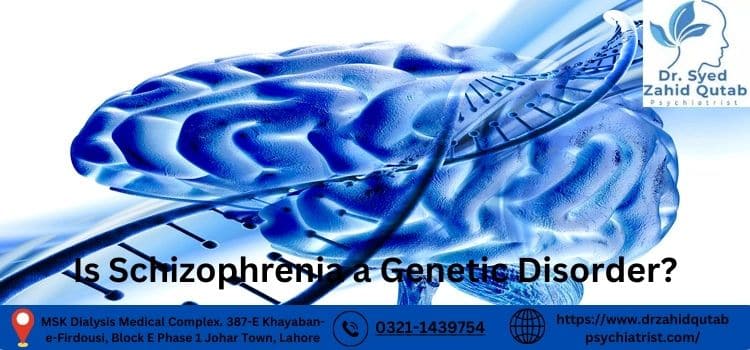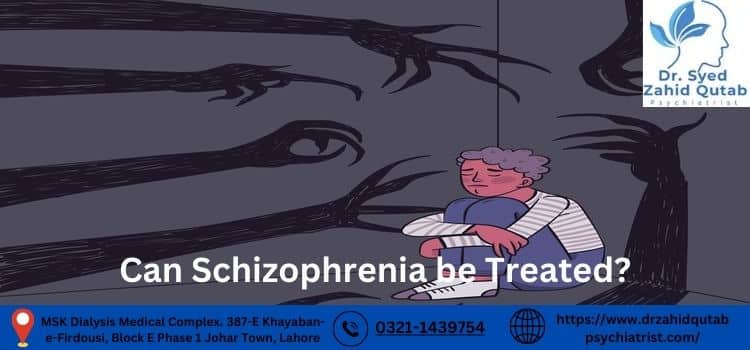Schizophrenia is one of the most complex and serious mental disorders, causing debilitating effects on a person’s life. But what is schizophrenia exactly? Is it predetermined by genetics or environmental factors, or both? Is Schizophrenia a Genetic Disorder?
In this comprehensive guide to schizophrenia we’ll dive in deep and explore the many facets of this disorder, including its causes, scientific explanations, potential treatments—and even how you can take control of your health if living with so-called “crazy thoughts.”
Read on to discover what scientists know about schizophrenia today, diving into understanding complicated yet necessary topics like genetic predisposition and environmental triggers.
Is Schizophrenia a Genetic Disorder?

The short answer is yes, schizophrenia has a genetic component. However, it’s not a simple “if you have the gene, you will develop schizophrenia” scenario. Instead, research suggests that multiple genes may interact with environmental factors to increase the risk of developing schizophrenia.
In fact, researchers estimate that genetics account for approximately 80% of the risk of developing schizophrenia. This means that having a family history of schizophrenia or other mental illnesses can increase your chances of developing it.
What Exactly is Schizophrenia?
Schizophrenia is a chronic and severe mental disorder that affects how a person thinks, feels, and behaves. It is characterized by symptoms such as delusions, hallucinations, disorganized thinking and speech, and reduced expression of emotions. These symptoms can significantly impair daily functioning and can make it difficult for individuals to maintain relationships, hold a job, or take care of themselves.
Symptoms of Schizophrenia
The symptoms of schizophrenia can be divided into three categories: positive, negative, and cognitive.
- Positive symptoms: These are psychotic behaviors that are not typically seen in healthy individuals. They include delusions, hallucinations, and disorganized thinking and speech.
- Negative symptoms: These refer to a loss or decrease in normal functioning. They include reduced expression of emotions, lack of motivation, and difficulty with everyday tasks.
- Cognitive symptoms: These involve difficulties with attention, memory, and decision-making. They can also include poor executive functioning and trouble understanding information.
It’s important to note that individuals with schizophrenia may experience a combination of these symptoms at varying levels of severity. Additionally, the onset and progression of symptoms can differ greatly from person to person.
Does Research has shown that there is a strong genetic?
Yes, research has shown that there is a strong genetic component to schizophrenia. In fact, studies have identified specific gene variations that are more commonly found in individuals with schizophrenia compared to the general population.
One of the most well-studied genes is called DISC1 (Disrupted in Schizophrenia 1). This gene plays a role in regulating brain development and has been linked to an increased risk of developing schizophrenia.
However, having these gene variations does not guarantee that a person will develop schizophrenia. Other factors, such as environmental triggers and lifestyle choices, also play a significant role in the development and progression of the disorder.
Environmental Triggers
While genetics do play a significant role in increasing the risk of developing schizophrenia, environmental triggers can also contribute to the development of the disorder.
Factors that have been linked to schizophrenia include:
- Exposure to viruses or toxins during pregnancy
- Traumatic experiences, especially during childhood
- Prenatal malnutrition
- Substance abuse, particularly in adolescence and early adulthood
It’s important to note that these factors do not directly cause schizophrenia. Rather, they may interact with genetic predisposition to increase the likelihood of developing the disorder.
Can Schizophrenia be Treated?

Yes, there are treatments available for individuals with schizophrenia. These include medication, therapy, and lifestyle changes.
Medications such as antipsychotics can help manage symptoms of schizophrenia and improve functioning. Therapy, including cognitive behavioral therapy (CBT), can also be beneficial in helping individuals cope with symptoms and improve their daily lives.
In addition, lifestyle changes such as maintaining a healthy diet, exercising regularly, and avoiding substance use can also play a role in managing schizophrenia.
Coping with Schizophrenia
Living with schizophrenia can be challenging, but it is possible to take control of your health and lead a fulfilling life. Here are some tips for coping with schizophrenia:
- Educate yourself about the disorder and its symptoms
- Seek support from family, friends, or a therapist
- Practice stress management techniques
- Take medication as prescribed by your doctor
- Engage in healthy activities such as exercise and hobbies
Remember that everyone’s experience with schizophrenia is unique, and what works for one person may not work for another. It’s important to find coping strategies that work for you and to not be too hard on yourself if certain things don’t work.
Conclusion
In conclusion, many people have question Is Schizophrenia a Genetic Disorder? While genetics do play a significant role in the development of schizophrenia, it is not the sole determining factor. Environmental triggers can also contribute to the disorder, and treatments are available to help manage symptoms and improve daily functioning.
With proper support and coping strategies, it is possible to live a fulfilling life with schizophrenia. So, individuals should not hesitate to seek help if they are experiencing symptoms or have a family history of the disorder. It’s important to remember that seeking treatment is a sign of strength, not weakness, and can greatly improve one’s quality of life.
FAQs
Some of the frequently asked question by people are mentioned below:
Is schizophrenia 100% genetic?
No, schizophrenia is not 100% genetic. While having a family history of the disorder can increase one’s risk, environmental triggers and other factors also play a role in its development.
Is schizophrenia inherited from mother or father?
Research suggests that both parents can pass on genetic predispositions for schizophrenia, although the exact inheritance patterns are not fully understood. Environmental factors such as stress and substance abuse may also contribute to the development of the disorder.
What type of genetic disorder is schizophrenia?
Schizophrenia is considered a complex genetic disorder, meaning that it involves multiple genes and environmental factors. Specific gene variations have been identified as being more common in individuals with schizophrenia, but there is no single gene responsible for the disorder.
How much of schizophrenia is genetic?
Studies have shown that genetics play a significant role in the development of schizophrenia, with estimates ranging from 60-80% genetic influence. However, other factors such as environmental triggers and lifestyle choices also contribute to the disorder.
